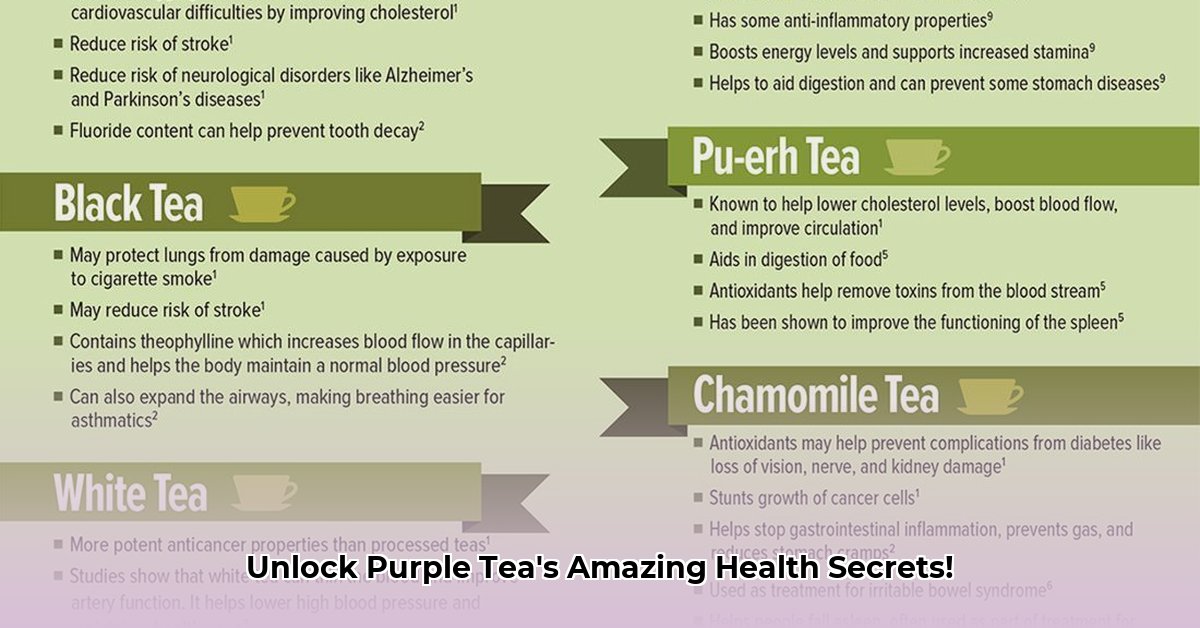
Benefits of Drinking Purple Tea: A Scientific Review
Purple tea, a unique beverage originating from Kenya, is garnering attention for its potential health benefits. This review examines the current scientific evidence regarding purple tea's impact on various aspects of health, acknowledging both supportive and contradictory findings. While promising, the research is still in its early stages, and more robust studies are needed to draw definitive conclusions.
The Antioxidant Powerhouse: Anthocyanins and Cellular Protection
Purple tea's distinctive color stems from its high concentration of anthocyanins (plant pigments also found in blueberries). These potent antioxidants combat oxidative stress, a process linked to numerous chronic diseases. Numerous studies demonstrate a correlation between increased antioxidant intake and reduced risks of conditions like heart disease and certain cancers. However, the specific impact of purple tea's anthocyanins requires further investigation to determine efficacy and optimal dosage for human health benefits. Does this mean purple tea can single-handedly prevent these diseases? Not necessarily; it’s crucial to maintain a balanced lifestyle alongside any dietary additions.
Cardiovascular Health: Early Evidence, Ongoing Research
Preliminary research suggests purple tea may offer cardiovascular benefits. Some studies indicate potential for reductions in LDL cholesterol ("bad" cholesterol) and improvements in vascular function. However, these findings largely originate from smaller-scale studies, and larger, more rigorous clinical trials are needed to confirm these initial observations and quantify the clinical relevance. "It's important to emphasize that purple tea isn't a replacement for a healthy lifestyle," states Dr. Anya Sharma, Cardiologist at Massachusetts General Hospital. "Regular exercise, a balanced diet, and stress management remain crucial for optimal cardiovascular health."
Cognitive Function: Promising Animal Studies, Needed Human Trials
Early research, primarily involving animal models, suggests a potential link between purple tea consumption and enhanced cognitive function. These studies show improvements in memory and concentration in animals; however, translating these findings to humans requires further investigation via well-designed human clinical trials. "Extrapolating results from animal studies to humans is often unreliable," cautions Dr. Benjamin Lee, Neuroscientist at Stanford University. "We need rigorous human trials to assess purple tea's effects on cognitive function in people."
Skin Health: Anecdotal Evidence and Future Research Directions
Anecdotal evidence and some preliminary findings suggest a possible link between purple tea consumption and improved skin health. Some individuals report increased skin hydration and reduced oiliness. However, this remains largely unsubstantiated, requiring substantial further research with rigorous methodologies. The complexity of skin health necessitates a multi-faceted approach, and considering purple tea’s impact in isolation might be misleading.
Uncertainties and Knowledge Gaps: The Need for Rigorous Research
Despite the promising early findings, considerable research gaps remain concerning purple tea. Many current studies are limited by size, focus on animal models, or lack reproducibility. The bioavailability (absorption and utilization) of purple tea's anthocyanins in the human body requires further investigation. This lack of comprehensive data restricts the ability to make definitive claims about its health benefits. What are the long-term effects? What interaction might there be with other medications? These are crucial questions that require further exploration. It’s not yet possible to definitively state the extent of purple tea's effects on human health.
Potential Interactions and Side Effects: Considerations for Consumers
As with any dietary supplement, purple tea might interact with certain medications or cause minor side effects in susceptible individuals. Although its caffeine content is lower than that of black or green tea, individuals sensitive to caffeine should exercise caution. Some individuals may experience mild digestive discomfort. Consult your physician before incorporating purple tea into your diet, especially if you have pre-existing health conditions or are taking prescription medications.
Purple Tea's Place in a Holistic Health Approach
Purple tea shows early promise as a potential contributor to overall well-being, particularly due to its rich antioxidant profile. However, it's not a panacea. A well-rounded lifestyle, encompassing balanced nutrition, regular exercise, adequate sleep, and effective stress management, remains paramount for maintaining optimal health. Purple tea can be viewed as one element of a broader strategy, not the central pillar.
The Future of Purple Tea Research: Essential Next Steps
To accurately assess the purported benefits of purple tea, large-scale, well-designed clinical trials involving diverse populations are urgently needed. Comprehensive studies focusing on the bioavailability and metabolism of anthocyanins in humans are crucial. Long-term studies examining potential interactions with medications and assessing potential long-term health outcomes are also essential to ensure comprehensive understanding of its effects.
Summary Table: Evidence Assessment
| Potential Benefit | Evidence Level | Notes |
|---|---|---|
| Antioxidant Activity | Strong | High anthocyanin content is well-documented. |
| Cardiovascular Health | Moderate | Some suggestive studies, but larger trials needed for confirmation. |
| Cognitive Function | Weak | Primarily preclinical data; human studies lacking. |
| Skin Health | Weak | Largely anecdotal evidence; rigorous studies required. |
Disclaimer: This information is for educational purposes only and does not constitute medical advice. Consult your physician before making significant dietary changes.